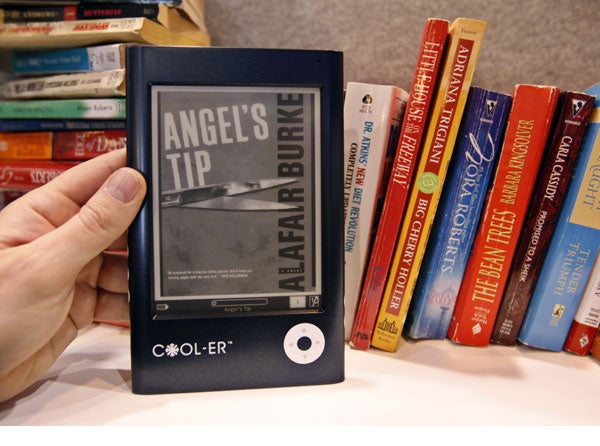Boyd Tonkin: Time to delete the digital drivel
The Week In Books

Your support helps us to tell the story
From reproductive rights to climate change to Big Tech, The Independent is on the ground when the story is developing. Whether it's investigating the financials of Elon Musk's pro-Trump PAC or producing our latest documentary, 'The A Word', which shines a light on the American women fighting for reproductive rights, we know how important it is to parse out the facts from the messaging.
At such a critical moment in US history, we need reporters on the ground. Your donation allows us to keep sending journalists to speak to both sides of the story.
The Independent is trusted by Americans across the entire political spectrum. And unlike many other quality news outlets, we choose not to lock Americans out of our reporting and analysis with paywalls. We believe quality journalism should be available to everyone, paid for by those who can afford it.
Your support makes all the difference.As Chris Evans hogs headlines to make presidents and princes envious, it's plainer than a carrot on a snowman's face that video did not kill the radio star. Neither will e-books vanquish the print-and-paper version, although they will coexist in ways that no one can yet reliably define. But everybody tries. With any fledgling electronic medium, remember the 1/99 rule. This iron law (which I made up this week) states that any high-profile new technology which now occupies only a tiny fraction of its potential market share will grab nearly 100 per cent of the space for chatter, divination and pontification available in its business at the time.
In the case of electronic readers, this principle needs a rider. Since all senior executives in publishing already follow the 1/99 rule, to stand out from the pack they need a USP. At the moment, that involves plucking from the ether an absurdly early date at which 50 per cent of all books will be downloaded rather than shipped in dead-tree form.
Will it happen by 2020? In five years' time? Before the London Olympics? Since the auction on the birth of a gizmo-ruled tomorrow has nothing to do with reality and everything to do with the egos of corporate suits who vainly yearn to sound hip, anyone can bid. I predict that, by 23 July 2011 at 4.45pm, all books will be scanned directly into readers' brains via granite monoliths tended by trained baboons.
In the meantime, I intend to market a state-of-the-art device known as the DigiDrivel. It will instantly convert any press release, strategy document or keynote speech about electronic reading into a chunky, slightly dog-eared old paperback with dampish pages. You will be able to annotate this withour fear of a recall because of copyright infringement, pass it on to a friend without breaching the criminal law, read that funny third chapter backwards to see how it worked, riffle through the whole thing in seconds to find that nice bit where the mother and daughter come across a fox on the patio, and then give it to Oxfam when you're done.
In the immortal words of screenwriter William Goldman about Hollywood studio policy: nobody knows anything. Last week's Consumer Electronics Show in Las Vegas gave a fair idea of why. The technologies of e-reading – not to mention all the unresolved issues of copyright, compatibility and access – remain in a volcanic flux.
Neither Sony's reader nor Amazon's Kindle could deliver that never-to-happen "iPod moment". In Las Vegas, new-model devices sprung from their makers like fantasy beasts: the Que, the Blio, the Adam, the Skiff. Apple's secret "Tablet", which already has a ferocious mental grip on insiders, lurks in the undergrowth as the velociraptor that may turn its rivals into so much hi-tech hamburger. We shall see.
Behind this frenzy of guesswork lies a yawning absence of intelligent debate about content and process. Yes, more people will do more reading electronically. But what, where, and how? An example: 2009 saw a robust comeback for the bulky-long-haul novel, all the way from Stieg Larsson to Hilary Mantel. When e-readers first came over the pixellated horizon, critics pondered whether compact and fragmented genres of literature might best match their use: short stories, essays and articles, perhaps poetry. Some even dreamed of a hybrid, hypertext artwork offering a garden of forking paths and plots.
Yet most people who want books to enrich their lives still appreciate the meaty narrative in traditional forms. As they have matured, computer games have absorbed almost all the audience for multi-layered online narratives. So how does the functionality of e-readers, both present and future, fit with the way that we enjoy different kinds of text, from the sonnet to the saga? Let's have this discussion soon. But never expect the sultans of spin in giant publishers to lead it. In bytes or ink or sound-waves, we need to hear the writer's – and the reader's – voice.
P.S.The presence of mini-stars such as Gok Wan and Laila Rouass among the "hosts" for the new TV Book Club - made by Amanda Ross's Cactus TV for Channel 4 - has prompted the same sort of sniping that greeted the early days of Richard & Judy. We'll see how they perform, but the initial line-up of ten titles for the series (which airs on More 4 from this Sunday, with C4 repeats) has at least as much depth and diversity as any of the R&J seasons. It includes the new books from such novelists as Liz Jensen, George Pelecanos, Abraham Verghese and Roma Tearne (left), as well as firm favourites Sarah Waters, Nick Hornby and Sarah Dunant. Not a disgrace by TV (or, for that matter, book trade) standards – although non-fiction deserves a better deal than the solitary, but excellent,work of history in the inaugural list: Wendy Moore's Wedlock.
b.tonkin@independent.co.uk
Join our commenting forum
Join thought-provoking conversations, follow other Independent readers and see their replies
Comments